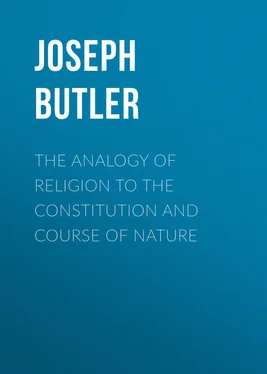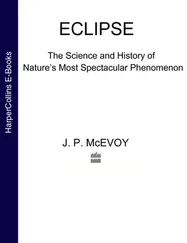Joseph Butler - The Analogy of Religion to the Constitution and Course of Nature
Здесь есть возможность читать онлайн «Joseph Butler - The Analogy of Religion to the Constitution and Course of Nature» — ознакомительный отрывок электронной книги совершенно бесплатно, а после прочтения отрывка купить полную версию. В некоторых случаях можно слушать аудио, скачать через торрент в формате fb2 и присутствует краткое содержание. Жанр: foreign_antique, foreign_prose, на английском языке. Описание произведения, (предисловие) а так же отзывы посетителей доступны на портале библиотеки ЛибКат.
- Название:The Analogy of Religion to the Constitution and Course of Nature
- Автор:
- Жанр:
- Год:неизвестен
- ISBN:нет данных
- Рейтинг книги:3 / 5. Голосов: 1
-
Избранное:Добавить в избранное
- Отзывы:
-
Ваша оценка:
- 60
- 1
- 2
- 3
- 4
- 5
The Analogy of Religion to the Constitution and Course of Nature: краткое содержание, описание и аннотация
Предлагаем к чтению аннотацию, описание, краткое содержание или предисловие (зависит от того, что написал сам автор книги «The Analogy of Religion to the Constitution and Course of Nature»). Если вы не нашли необходимую информацию о книге — напишите в комментариях, мы постараемся отыскать её.
The Analogy of Religion to the Constitution and Course of Nature — читать онлайн ознакомительный отрывок
Ниже представлен текст книги, разбитый по страницам. Система сохранения места последней прочитанной страницы, позволяет с удобством читать онлайн бесплатно книгу «The Analogy of Religion to the Constitution and Course of Nature», без необходимости каждый раз заново искать на чём Вы остановились. Поставьте закладку, и сможете в любой момент перейти на страницу, на которой закончили чтение.
Интервал:
Закладка:
5.) It is a sort of evidence distinct from direct history, though of the same nature.
6.) Men are suspicious as well as credulous, and slow to believe against their interests , as these did.
4.It lies upon unbelievers to show why all this array of proof is to be rejected; but in such an important concern we shall proceed to notice some possible objections.
Objec. 1. Enthusiasts make similar sacrifices for idle follies.
Ans. 1. This objection ignores the distinction between opinions and facts. Suffering for an opinion is no proof of its truth; but in attestation of observed facts, it is proof.
2. Enthusiasm weakens testimony, it is true, even as to facts; and so does disease, in particular instances . But when great numbers, not weak, nor negligent, affirm that they saw and heard certain things, it is the fullest evidence.
3. To reject testimony on the ground of enthusiasm, requires that the things testified be incredible ; which has not been shown, as to religion, but the contrary.
4. Religion is not the only thing in regard to which witnesses are liable to enthusiasm. In common matters, we get at the truth through witnesses, though influenced by party spirit, custom, humor, romance, &c. &c.
Objec. 2. Enthusiasm and knavery may have been combined in the apostles and first Christians.
Ans. Such a mixture is often seen, and is often reproved in Scripture; but not more in religious than in common affairs. Men in all matters deceive themselves and others, in every degree, yet human testimony is good ground of belief.
Objec. 3. Men have been deluded by false miracles.
Ans. Not oftener than by other pretences.
Objec. 4. Fabulous miracles have historical evidence.
Ans. 1. If this were equal to that for Scripture miracles, the evidence for the latter would not be impaired . The objection really amounts to this, that evidence proved not to be good, destroys evidence which is good and unconfuted! Or to this, that if two men, of equal reputation, testify, in cases not related to each other, and one is proved false, the other must not be believed!
2. Nothing can rebut testimony, but proof that the witness is incompetent, or misled.
3. Against all such objections must be set the fact that Christianity was too serious a matter to allow the first converts to be careless as to its evidence; and also that their religion forbid them to deceive others.
1.Obscurity as to part of a prophecy does not invalidate it, but is, as to us, as if that part were not written, or were lost. We may not see the whole prophecy fulfilled, and yet see enough fulfilled to perceive in it more than human foresight.
2.A long series of prophecies, all applicable to certain events, is proof that such events were intended. This answers the objection that particular prophecies were not intended to be applied as Christians apply them.
Mythological and satirical writings greatly resemble prophecy. Now we apply a parable, or fable, or satire, merely from seeing it capable of such application.
So if a long series of prophecies be applicable to the present state of the world, or to the coming of Christ, it is proof that they were so intended .
Besides, the ancient Jews, before Christ, applied the prophecies to him, just as Christians do now.
3.If it could be shown that the prophets did not understand their own predictions, or that their prophecies are capable of being applied to other events than those to which Christians apply them, it would not abate the force of the argument from prophecy, even with regard to those instances. For,
1.) To know the whole meaning of an author we must know the whole meaning of his book, but knowing the meaning of a book is not knowing the whole mind of the author.
2.) If the book is a compilation , the authors may have meanings deeper than the compiler saw. If the prophets spoke by inspiration, they are not the authors, but the writers of prophecy, and may not have known all that the Divine Spirit intended. But the fulfilment of the prophecy shows a foresight more than human.
This whole argument is just and real; but it is not expected that those will be satisfied who will not submit to the perplexity and labor of understanding it; or who have not modesty and fairness enough to allow an argument its due weight; or who wilfully discard the whole investigation.
We now proceed to THE GENERAL ARGUMENT embracing both direct and circumstantial evidence. A full discussion would require a volume, and cannot be expected here; but something should be said, especially as most questions of difficulty, in practical affairs, are settled by evidence arising from circumstances which confirm each other.
The thing asserted is that God has given us a revelation declaring himself to be a moral governor; stating his system of government; and disclosing a plan for the recovery of mankind out of sin, and raising them to perfect and final happiness.
1.It furnishes an account of the world, as God’s world.
1.) God’s providence, commands, promises, and threatenings.
2.) Distinguishes God from idols.
3.) Describes the condition of religion and of its professors, in a world considered as apostate and wicked.
4.) Political events are related as affecting religion, and not for their importance as mere political events.
5.) The history is continued by prophecy, to the end of the world.
2.It embraces a vast variety of other topics; natural and moral.
1.) Thus furnishing the largest scope for criticism.
2.) So that doubts of its truth confirm that truth, for in this enlightened age the claims of a book of such a nature could be easily and finally shown to be false, if they were so.
3.) None who believe in natural religion, hold that Christianity has been thus confuted.
3.It contains a minute account of God’s selecting one nation for his peculiar people, and of his dealings with them.
1.) Interpositions in their behalf.
2.) Threats of dispersion, &c. if they rebelled.
3.) Promises of a Messiah as their prince; so clearly as to raise a general expectation, &c.
4.) Foretelling his rejection by them, and that he should be the Savior of the Gentiles.
4.Describes minutely the arrival of the Messiah, and his life and labors; and the result, in the establishment of a new religion.
Suppose a person ignorant of all history but the Bible, and not knowing even that to be true, were to inquire into its evidence of authenticity, he would find,
1.That natural religion owes its establishment to the truths contained in this book. This no more disproves natural religion, than our learning a proposition from Euclid, shows that the proposition was not true before Euclid.
2.The great antiquity of revelation.
3.That its chronology is not contradicted but confirmed by known facts.
4.That there is nothing in the history itself to awaken suspicion of its fidelity.
1.) Every thing said to be done in any age or country, is conformable to the manners of that age and country.
2.) The characters are all perfectly natural.
Читать дальшеИнтервал:
Закладка:
Похожие книги на «The Analogy of Religion to the Constitution and Course of Nature»
Представляем Вашему вниманию похожие книги на «The Analogy of Religion to the Constitution and Course of Nature» списком для выбора. Мы отобрали схожую по названию и смыслу литературу в надежде предоставить читателям больше вариантов отыскать новые, интересные, ещё непрочитанные произведения.
Обсуждение, отзывы о книге «The Analogy of Religion to the Constitution and Course of Nature» и просто собственные мнения читателей. Оставьте ваши комментарии, напишите, что Вы думаете о произведении, его смысле или главных героях. Укажите что конкретно понравилось, а что нет, и почему Вы так считаете.












